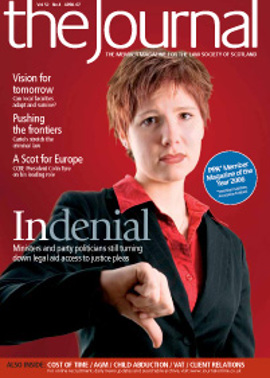Citizen justice

Section 60 of the Civil Procedure Act 2005 requires the court in Australia’s New South Wales to resolve disputes “in such a way that the cost to the parties is proportionate to the importance and complexity of the subject-matter in dispute”. The Chief Justice there concedes in an article on the Victorian Bar website that this is a “statement of ambition, rather than a description of what occurs”. Yet it is ambition which politicians in Scotland should embrace.
Median household income in Scotland for 2003-04 was £17,472. Yet in 2006-07 the maximum “disposable income” limit for civil legal aid was £9,781. Civil legal aid has become irrelevant for most citizens. Yet, most people of modest earnings cannot afford to raise sheriff court proceedings for fear of legal expense.
With the prospect of a newly elected Parliament we have an opportunity to reshape our civil justice system so that every citizen can access a remedy in proportion to the value and importance of their dispute. If a citizen cannot properly engage in the legal process for fear of cost, he or she may have no remedy or prospect of success.
Where a citizen’s liberty, children, health, housing, or livelihood are threatened by the action or inaction of another, I believe they should have access to a qualified legal practitioner. A solicitor or advocate is the best person to safeguard these important interests and the court is the best place to deal with these justiciable issues. But the civil court system is presently clogged up with non-justiciable issues: in 2002 decree for payment passed on an undefended basis in 75% of ordinary cause actions, 98% of summary causes, and 54% of small claims. This is not in the taxpayer’s interest.
I would like to offer some brief suggestions on what new Members of the Scottish Parliament could do to radically improve access to civil justice in Scotland.
- Introduction of a civil tribunal. All “non-contentious” payment actions could be taken out of the sheriff court (excluding personal injury and housing cases). This could include any claim for money up to £25,000 where the debtor did not proceed with a legal defence. Actions would still be raised in the sheriff court, but where no legal defence or response was intimated, the case could be automatically remitted to the civil tribunal. The tribunal could be inquisitorial and also have privative jurisdiction of consumer and unsecured debt contested disputes up to £5,000. It could incorporate the existing Debt Arrangement Scheme and include mediation services. Expenses could be fixed in order to ensure full access by all citizens.This would free up shrieval time and enhance the operation of the sheriff court.
- Extend the jurisdiction of the private rented housing committee. The new PRHC will deal with housing disrepair disputes within the private rented sector, around 7% of all households in Scotland. Over 65% of Scottish households are owner-occupiers, and over one third of these reside in properties that may require a property factor. Resolving disputes with factors is notoriously difficult and I support Gordon Jackson’s bill proposal for the PRHC to sit as a property management committee to handle property factors disputes across Scotland.
- More community law centres. The Scottish Legal Aid Board is not best placed to provide legal services directly. For almost 30 years community law centres in Scotland have proven to be a reliable and successful model to target unmet legal need. Law centres employ solicitors, money advisers and social workers, and can respond to local problems because they are ultimately managed by local citizens. Yet, there are very few law centres outwith Glasgow.
- A specialist service to tackle unlawful eviction. There are huge problems across Scotland with tenants in the private rented sector being harassed and unlawfully evicted by their landlord. It can be difficult to get the police to investigate with a view to criminal proceedings being brought, and equally difficult to raise civil proceedings. The Scottish Executive should fund a legal project working closely with local authorities and police forces to tackle this issue.
- Unfair bank charges. One in five people in Scotland may well have a claim against their bank for a refund of unfair bank charges over the last five years. Yet the small claims limit is restricted to £750 and most claims exceed that sum. It would helpful if citizens could raise proceedings akin to a small claim action for bank charge claims up to £10,000.
In this issue
- The bigger picture
- Citizen justice
- Purely rhetoric?
- Purely rhetoric? (1)
- Profit, team by team
- Bring them home
- Bring them home (1)
- Local roots
- Wanted! (for conspiracy)
- One voice
- AGM report
- Dealing positively with client concerns
- Block fees: the story behind the changes
- Think before you charge
- For the high jump
- Jury questions
- Put to the test
- Yet another expense
- Planning with people
- Lifting the lid
- Website reviews
- Book reviews
- Home is where the heart is
- PSG - new certificate of title
- SEPA: apply online and save
- SEPA: apply online and save (1)






